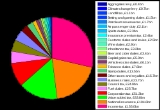
Taxation in the United Kingdom
Overview
Taxation in the United Kingdom may involve payments to a minimum of two different levels of government: The central government (HM Revenue and Customs) and local government
. Central government revenues come primarily from income tax
, National Insurance
contributions, value added tax
, corporation tax
and fuel duty
. Local government revenues come primarily from grants from central government funds, business rates in England and Wales, Council Tax
and increasingly from fees and charges such as those from on-street parking
.
Local government in the United Kingdom
The pattern of local government in England is complex, with the distribution of functions varying according to the local arrangements. Legislation concerning local government in England is decided by the Parliament and Government of the United Kingdom, because England does not have a devolved...
. Central government revenues come primarily from income tax
Income tax
An income tax is a tax levied on the income of individuals or businesses . Various income tax systems exist, with varying degrees of tax incidence. Income taxation can be progressive, proportional, or regressive. When the tax is levied on the income of companies, it is often called a corporate...
, National Insurance
National Insurance
National Insurance in the United Kingdom was initially a contributory system of insurance against illness and unemployment, and later also provided retirement pensions and other benefits...
contributions, value added tax
Value added tax
A value added tax or value-added tax is a form of consumption tax. From the perspective of the buyer, it is a tax on the purchase price. From that of the seller, it is a tax only on the "value added" to a product, material or service, from an accounting point of view, by this stage of its...
, corporation tax
United Kingdom corporation tax
Corporation tax is a tax levied in the United Kingdom on the profits made by companies and on the profits of permanent establishments of non-UK resident companies and associations that trade in the EU. Prior to the tax's enactment on 1 April 1965, companies and individuals paid the same income tax,...
and fuel duty
Hydrocarbon oil duty
Hydrocarbon oil duty is fuel tax levied on some fuels used by road vehicles in the United Kingdom. Between 1993 and 1999 the Government's Fuel Price Escalator led to significant rises in the cost of fuel which led to fuel tax protests in 2000, 2005 and 2007. In May 2008, UK fuel tax rates were one...
. Local government revenues come primarily from grants from central government funds, business rates in England and Wales, Council Tax
Council tax
Council Tax is the system of local taxation used in England, Scotland and Wales to part fund the services provided by local government in each country. It was introduced in 1993 by the Local Government Finance Act 1992, as a successor to the unpopular Community Charge...
and increasingly from fees and charges such as those from on-street parking
Decriminalised parking enforcement
Decriminalised parking enforcement is the name given in the United Kingdom to the civil enforcement of car parking regulations, carried out by civil enforcement officers, operating on behalf of either a local authority or a private firm. The Road Traffic Act 1991 Decriminalised parking enforcement...
.
Unanswered Questions

